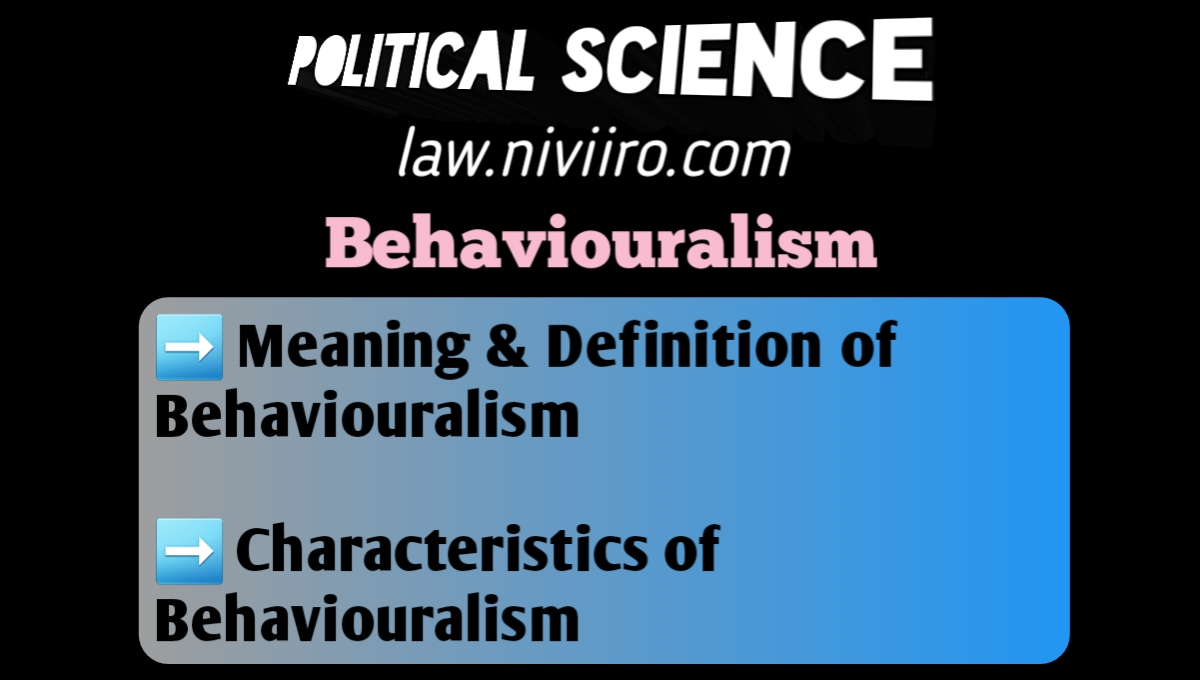One of the most significant developments in political science in the twentieth century was behavioralism. It is also regarded as a novel or contemporary approach to the study of political science. Though the term “behaviouralism’ was widely used by the Americans in the First Great War and subsequently, but its systematic approach started when an American Journalist, Franck Kent wrote a book under the title ‘Political Behaviour’ in 1928.
However, Kent limited the usage of this phrase to news correspondents who should describe events as they occur rather than as they are expected to occur. However, Herbert Tingston published a book titled ‘Political Behaviour’ studies in Election Statistics’ in 1937.
This helped the rapid growth of political behaviourism. Approximately twenty years after the end of World War II, the Behavioural Revolution in Politics grew rapidly. It has now become so significant that the study of numerous political problems affecting various nations is regarded inadequate without it. As a result, political issues must now be researched in depth from a fresh perspective.
Meaning and Definition of Behaviouralism
Meaning – Behavioralism emphasizes scientific objective and value-free study of political phenomena as conditioned by the environment, particularly the behaviour of the individual involved in that phenomena.
According to Heinz Eulou, “Modern behavioural science is eminently concerned not only with the acts of man but also with his cognitive, effective and evaluative process. Behaviour in political field refers not simply to directly or indirectly observable political action but also to those perceptual, motivational and attitudinal components of behaviour which make for man’s political identification. demands and his system of political benefits, values and goals.”
Behavioural approach, according to Dahl. “is an attempt to improve our understanding of points by seeking to explain the empirical aspects of political life by means of methods, theories and criteria of proof that are acceptable according to canons and assumptions of modern political science.” In this sense. “behavioural approach as the writer has recently observed. is distinguished predominantly by the nature of the purpose it is designed to serve. The purpose is scientific”
According to Dr. S.P. Verma, Behaviouralism could be interpreted as a renewed and reinforced effort to take the “science” in political science seriously on the lines of the physical and biological sciences, and in line with new developments in the fields of psychology and other Social Sciences.”
After reviewing all of the aforementioned definitions, we can conclude that behavioralism is not a new branch of knowledge, but rather a new strategy, a new approach, with a new goal in mind for the study of political science. It makes an effort to alter both the content and methodology of learning political science.
Characteristics of Behavioural Approach
There has been a difference of approach so much regarding behaviouralism that it has led Dwight Waldo to remark that “Behaviouralism was not and is not a clear and firm creed, an agreed upon set of postulates and rules.”
Still there are some general characteristics of behaviouralism which are given below :
Movement of Protest
As previously said, behavioralism is a form of protest movement against the shortcomings of conventional political science, mostly headed by American political scientists. They are deeply unsatisfied with mainstream Political Science’s successes due to its shortcomings. The conventional Political Science confined its study to the State and Government, and he ignored political phenomena and human behaviour. As a result, he ignored the study of many social and political issues confronting human society today.
Hence Dahl has observed correctly: “Historically speaking, the behavioural approach was a protest movement within political science behavioural approach came to be associated with a number of political scientists. primarily Americans who shared a strong sense of dissatisfaction with conventional political science’s achievement, particularly through historical, philosophical, and descriptive institutional approaches, and a belief that additional methods and approaches either existed or could be developed that would help provide political science with empirical propositions and theories of systematic order.”
As a result, behavioralism has turned its attention from the ideal state, government, and political institutions to citizens’ current political difficulties. As a result, new methods of study and research in Political Science have emerged.
Scientific outlook and Objectivity
Behaviouralism emphasises the relevance of scientific perspective and objectivity. Because ethical values cannot be researched scientifically and objectively, behaviourists ignore them. Instead, they urge for value-free political science. They place a premium on empirical values derived from extensive objective research and scientific examination.
Focus on Behaviour
Behaviouralism is a form of protest movement against traditional approaches in Political Science; as a result, behavioralism has centred on the person in the study of political processes. The behavioralists believed that, while behaviour varies from person to person, it exhibits certain characteristics of regularity. As a result, they believe that behaviour can be stated in broad terms and predicted. However, it must be stated that an individual’s behaviour is shaped by his own psychological make-up as well as the social environment in which he lives.
Many elements influence an individual’s psychological make-up, including not only emotions, instincts, passions, sensations, prejudices, and fascinations, but also values and opinions. A person’s social environment also influences him because he may behave differently in different environments and circumstances. As a result, behavioralists are concerned with an individual’s political behaviour as a member of a group and an institution.
Invention of scientific theory
The primary goal of behavioralists is to develop a scientific theory through observation and experiments that can predict events and be applied universally. Eulou emphasises that theory development is a critical foundation for political behaviour research and that it greatly aids the researcher in properly understanding and analysing empirical evidence. Traditional political theory could never be empirically proven and evaluated.
Inter-disciplinary study
An individual’s political behaviour is part of the entire social behaviour of all persons. A modern researcher in Political Science must consult numerous social sciences or disciplines such as Sociology, History, Economics, and Anthropology, among others, in order to gain a thorough understanding. Durkheim, Malin Dwaski, Parsons, Shils, and Eisenstadt were among the great anthropologists and sociologists who contributed significantly to systems theory and the structural-functional approach.
Modern political scientists have begun to study the writings of the aforementioned prominent sociologists and anthropologists because the behavioural method cannot be fully understood without a thorough understanding of other fields (social sciences).
Fula has made an accurate observation in this regard “A man’s political behaviour is only one of his total behaviour as a social being, political behaviour analysis must be interdisciplinary It cannot neglect the wider context in which political action occurs. It is bound, therefore to consider the possible effects of social, cultural and personal factors on political behaviour”
Methodological Revolution
Behaviouralism ushered in an entirely new approach to the study of political research. As a result, some academics see behavioralism as nothing more than a methodological revolution in political science. Whereas classical political scientists used philosophical, historical, or comparative methodologies to analyse issues, behavioural scientists emphasise procedures such as observation, interviews, surveys, research, case studies, data gathering, statistical analysis, quantification, and so on.
Behavioralists have frequently borrowed from natural sciences such as mathematics, statistics, physics, biology, and so on. To be an expert in behavioural approaches, one must have a solid understanding of statistics and model-building. Model-building examples include Easton and Almond’s political system model and Karl Deutsch’s Cybernetics model. In this strategy, researchers create models and collect data with their assistance.
Related Post
Define ‘Behaviouralism’ ?
Meaning – Behavioralism emphasizes scientific objective and value-free study of political phenomena as conditioned by the environment, particularly the behaviour of the individual involved in that phenomena.
According to Heinz Eulou, “Modern behavioural science is eminently concerned not only with the acts of man but also with his cognitive, effective and evaluative process. Behaviour in political field refers not simply to directly or indirectly observable political action but also to those perceptual, motivational and attitudinal components of behaviour which make for man’s political identification. demands and his system of political benefits, values and goals.”
Explain the Characteristics of Behavioural Approach ?
Movement of Protest
As previously said, behavioralism is a form of protest movement against the shortcomings of conventional political science, mostly headed by American political scientists…..
Focus on Behaviour
Behaviouralism is a form of protest movement against traditional approaches in Political Science; as a result, behavioralism has centred on the person in t……….
References
- Prof. S.L. Verma, Modern Political Theory
- Prof. H.C. Verma, Modern Political Theory
- J.C. Johari, Political Science
- V.D. Mahajan, Political Theory
- R.C. Agarwal, Political Theory
- M.P. Jain, Political Theory liberal and Marxiam

















